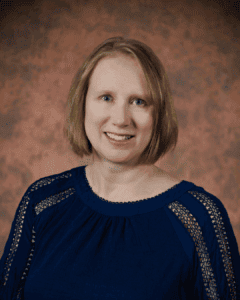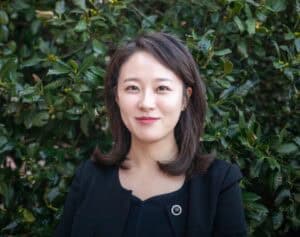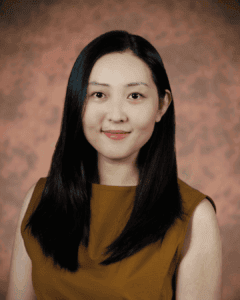The College of Communication and Information is excited to welcome five new faculty members: Dillon Pruett, Seul Lee, Qunfang Wu, Dawn Sowers, and Pengfei Zhao.
Dillon Pruett – Assistant Professor
Dr. Dillon Pruett has joined the School of Communication Science and Disorders, where he primarily studies the genetics of stuttering through the use of electronic health records and biobanks. Pruett will have his own research lab at Florida State University (FSU), where he will strive to translate scientific discoveries into tangible clinical applications that create a positive impact on individuals who stutter. Pruett hopes to build upon his research team’s recent landmark genome-wide association study (GWAS) on stuttering.
“I was particularly excited about the school’s emphasis on advancing research and felt it would be a great fit for my work applying machine learning approaches to electronic health records and genetic biobanks. I believe this research will complement the existing strengths of the faculty and help us explore new, innovative avenues of research,” Pruett said.
For his fun fact, Dr. Pruett shared that he has attended two chimpanzee funerals (R.I.P. Washoe and Dar) because his father was a research assistant at the Chimpanzee and Human Communication Institute.
Pengfei Zhao- Assistant Professor
 Dr. Pengfei Zhao has joined the School of Communication with a focus on the psychological and interpersonal processes and the effects of rising technology, such as AI. Her current research delves into themes of moral behaviors from AI and how it impacts behavioral norms and relations between people. Zhao’s research also delves into advancing human–AI interaction for supportive communication. Recently, Zhao has had her work published in the PNAS Nexus of computer-mediated communication; their study asked, “are there more socially constructive ways to achieve justice in response to online offenses?”
Dr. Pengfei Zhao has joined the School of Communication with a focus on the psychological and interpersonal processes and the effects of rising technology, such as AI. Her current research delves into themes of moral behaviors from AI and how it impacts behavioral norms and relations between people. Zhao’s research also delves into advancing human–AI interaction for supportive communication. Recently, Zhao has had her work published in the PNAS Nexus of computer-mediated communication; their study asked, “are there more socially constructive ways to achieve justice in response to online offenses?”
Dawn Sowers – Assistant Professor
 Dr. Dawn Sowers joined the School of Communication of Sciences and Disorders. Her research is focused on the use of technology to support individuals with motor and speech disabilities who may benefit from the use of technology to support communication. Primarily, Sowers wants to use AI capabilities to optimize system design for individuals with disabilities that could improve their circumstance through communication support.
Dr. Dawn Sowers joined the School of Communication of Sciences and Disorders. Her research is focused on the use of technology to support individuals with motor and speech disabilities who may benefit from the use of technology to support communication. Primarily, Sowers wants to use AI capabilities to optimize system design for individuals with disabilities that could improve their circumstance through communication support.
“I chose to come to FSU because of the potential for collaboration with outstanding colleagues who have similar interests and the highly supportive environment for both teaching and research,” Sowers said.
Before coming to FSU, Sowers was a speech-language pathologist (SLP) and practiced for 20 years before pursuing a career in academia.
Seul Lee- Assistant Professor
 Dr. Seul Lee joins the School of Information, where her work is mainly aligned with AI and information. Lee has studied across several countries, originally studying in South Korea before moving to London, Los Angeles, and now Tallahassee, Florida. By studying and working across multiple locations, Lee understands how people are shaped by culture and environment, and there really is no “default” way of being. At FSU, Lee studies information bias and how information in the digital sphere is passed through so many filters and then is reshaped by our own cultural interpretations of the information.
Dr. Seul Lee joins the School of Information, where her work is mainly aligned with AI and information. Lee has studied across several countries, originally studying in South Korea before moving to London, Los Angeles, and now Tallahassee, Florida. By studying and working across multiple locations, Lee understands how people are shaped by culture and environment, and there really is no “default” way of being. At FSU, Lee studies information bias and how information in the digital sphere is passed through so many filters and then is reshaped by our own cultural interpretations of the information.
“I’ve always been interested in what’s behind the information we see, encounter, use, and rely on every day—how it’s created and technically structured, how different actors reshape it, how culture influences it, how it’s circulated and presented, and how it ultimately affects the way we think and act,” Lee said.
While Lee is heavily involved in studying social media, she is not active on any form of media. She studies the internet feeds without necessarily being a part of the algorithm.
Qunfang Wu – Assistant Professor
 Dr. Qunfang Wu joins the School of Information, where she will study the interactions between people and AI systems. She strives to challenge socio-technical systems to advocate for design justice perspectives as she researches Human-Computer Interaction (HCI). At FSU, Wu plans to continue to implement interactive tools and educational interventions that empower users to shape their personalized experiences and promote algorithmic transparency. Previously, Wu was a postdoctoral fellow at Harvard, where her work focused on how algorithmic systems can perpetuate harm and how users resist those systems in everyday life.
Dr. Qunfang Wu joins the School of Information, where she will study the interactions between people and AI systems. She strives to challenge socio-technical systems to advocate for design justice perspectives as she researches Human-Computer Interaction (HCI). At FSU, Wu plans to continue to implement interactive tools and educational interventions that empower users to shape their personalized experiences and promote algorithmic transparency. Previously, Wu was a postdoctoral fellow at Harvard, where her work focused on how algorithmic systems can perpetuate harm and how users resist those systems in everyday life.
“I was drawn to FSU because of its supportive and open academic environment. The university places real value on diverse forms of scholarship and offers flexibility in how faculty contributions are recognized. I appreciate the emphasis on professional development and the commitment to creating space for different types of impactful work,” Wu said.
Apart from her work on AI at FSU, Wu once moved across four different cities in one year—Syracuse, Chapel Hill, Columbus, and Boston—making her efficient in curating the feeling of home no matter where she ends up. Wu has self-proclaimed packing as one of her elite skills after the amount of moving she has experienced.


